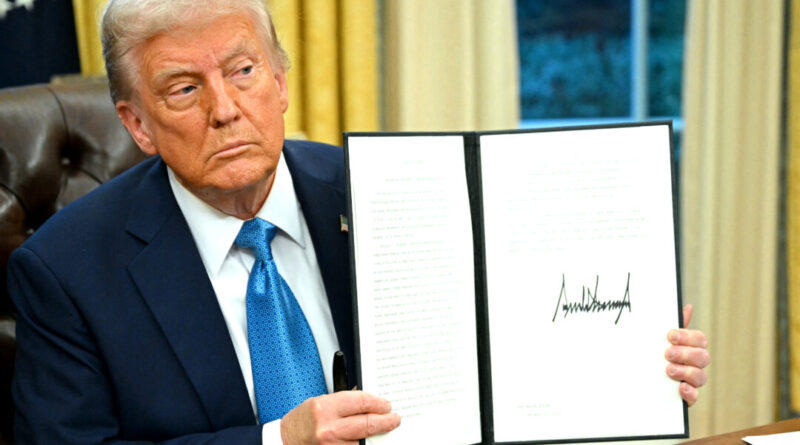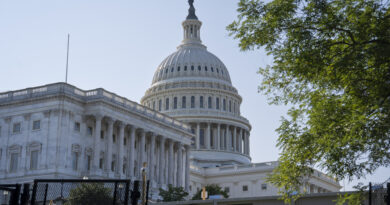White House Declares Tariffs as a ‘Necessary Measure’ Amidst Criticism
Industry organizations contend that implementing extensive tariffs will not resolve the fentanyl crisis, although families impacted by the issue are in favor of this action.
WASHINGTON—On Sunday, the Trump administration released a series of statements reiterating President Donald Trump’s viewpoint that tariffs on Canada, Mexico, and China are a “necessary solution.”
Trump countered the criticisms from various groups, including certain business organizations and the Wall Street Journal, which assert that these tariffs may lead to inflation, negatively affecting consumers and the broader economy.
“The ‘Tariff Lobby,’ led by the Globalist, and always in error, Wall Street Journal, is making a concerted effort to defend countries like Canada, Mexico, and China,” Trump posted on Truth Social on Sunday morning.
He accused them of facilitating a long-standing “rip-off of America” through trade, criminal activities, and the surge of drugs entering the nation.
“Those days are over!” he emphasized, using all capital letters.
In the wake of this statement, the White House disseminated a comprehensive report featuring data and sources to justify the tariffs and highlight their beneficial effects on the U.S. economy, job creation, and the reduction of the trade deficit. Another announcement criticized the Wall Street Journal, accusing it of endorsing “America Last policies.”
The White House report indicated that fentanyl overdose fatalities in the U.S. surged nearly 25-fold from 2012 to 2022.
The majority of fentanyl entering the U.S. is manufactured in Mexico using chemical precursors imported from China, as noted in the report, which also highlighted the Chinese Communist Party’s (CCP) active support by offering tax rebates, grants, and even owning stakes in firms engaged in trafficking fentanyl and its precursors.
Two major drug cartels in Mexico are responsible for inundating the United States with fentanyl, which has exacerbated the worst drug crisis in American history.
Although not as significant as Mexico’s drug trafficking, there has been a notable rise in fentanyl smuggled into the U.S. from Canada in recent years.
Sandra Martinez of California lost her daughter to fentanyl in 2020 following a traumatic incident.
“I’m incredibly grateful that Trump is back in power and can take charge; I appreciate the steps he has taken,” Martinez shared with The Epoch Times, referring to the newly proposed tariffs.
Evelyn Jones, a Trump supporter whose child has been impacted by drugs, stated that “fentanyl and synthetic drugs have devastated families across the United States.”
She expressed to The Epoch Times that even if the children no longer engage in synthetic drug use, the repercussions persist, contributing to a “mental illness epidemic.”
Reactions to Tariffs
Trump invoked the International Emergency Economic Powers Act (IEEPA) to implement tariffs on Mexico, Canada, and China starting from February 1, targeting the countries’ roles in facilitating the influx of illicit fentanyl and illegal immigration into the U.S.
He issued an executive order imposing a 25 percent tariff on all non-energy imports from Canada and a 10 percent tariff on energy imports, taking effect on February 4. In separate executive orders, he also set a 25 percent tariff on all imports from Mexico and an additional 10 percent tariff on all imports from China, alongside existing levies.
U.S. industry leaders, including the U.S. Chamber of Commerce (USCC), expressed varied reactions to the announcement.
“While the President is correct to address pressing issues like our problematic border and the fentanyl crisis, the implementation of tariffs under IEEPA is unprecedented, will not resolve these issues, and will solely increase costs for American families while disrupting supply chains,” stated John Murphy, vice president of USCC.
Steve Lamar, president and CEO of the American Apparel & Footwear Association, warned that the tariffs would negatively impact essential export markets relied upon by American farmers and manufacturers.
“The extensive tariff actions on Mexico, Canada, and China announced this evening will add massive costs to our economy, already strained by inflation, while potentially triggering a damaging retaliatory tariff war,” Lamar commented.
In response to Trump’s announcement, the Wall Street Journal editorial board published an op-ed titled “The Dumbest Trade War Fallout Begins.”
“We appreciate Mr. Trump’s focus, though we oppose tariffs and do not engage in lobbying,” the editorial board remarked. “However, poor policy yields harmful consequences, regardless of Mr. Trump’s admissions.”
Both Canada and Mexico have promised to retaliate against Trump’s tariffs.
Analysts predict that the impact of tariffs on the smaller economies of Canada and Mexico could be significantly more severe than in the U.S.
“Since exports to the U.S. constitute approximately 20 percent of their GDP, the tariffs introduced today could potentially drive both the Canadian and Mexican economies into recession later this year,” Paul Ashworth, chief North America economist at the London-based research firm Capital Economics, indicated in a report.
White House Responds to Critics
The White House defended the tariffs by referencing a 2024 McKinsey analysis indicating that tariffs could diminish competition, enhance demand for U.S. products, and generate American jobs. It cited another report showing that tariffs have led to substantial reshoring in sectors such as manufacturing and steel production.
“President Trump’s global tariffs on steel resulted in the creation of over 4,000 new jobs in the U.S.,” stated the White House.
The report also highlighted the decrease in the trade deficit with China since tariffs were imposed during the first Trump administration.
“President Trump’s tariffs in 2018 were so effective that the Biden administration had no option but to maintain and expand them,” the report asserted.
Additionally, it referenced former Treasury Secretary Janet Yellen’s claim that tariffs do not significantly increase consumer prices, as well as a bipartisan group of senators who urged President Joe Biden to reinstate steel tariffs on Mexico in September 2024.
The White House claimed that the threat of tariffs is effective, driving companies to consider relocating production to the U.S. It cited statements from several CEOs contemplating relocation to evade the tariffs.
Following the announcement of the tariffs, stock futures declined significantly on Sunday night.




